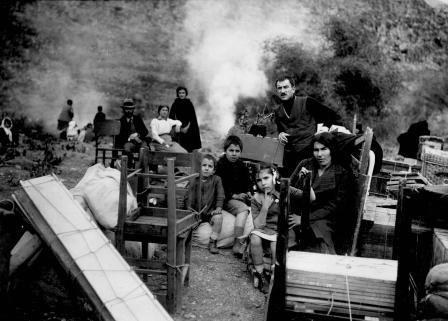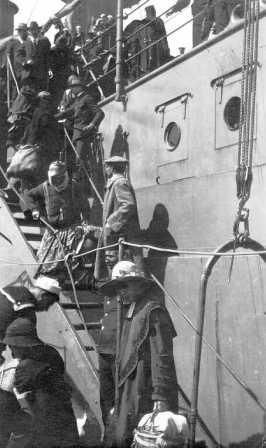In July, the world marked 100 years since the outbreak of World War I. This war was exceptional in terms of the number of states and the amount of people who took part in it. That is why it was called “The Great War” by its contemporaries. The CZA holds many documents from that period; these documents show various aspects of the war.
The Jews in Palestine – like people the world over – suffered considerably during the War. The Yishuv was dependent on the financing it received from various European countries. The connection between the Jews in Palestine and the Jews in Europe was cut off during World War I. Funds were not transferred to Palestine and the Yishuv ceased exporting crops to Europe. In addition, natural disasters descended on the country: locusts and a drought. The meager food that remained was confiscated by the Ottoman Army which fought the British Army over the land of Palestine.
After World War I started, the attitude of the Ottoman authorities to the Jews in Palestine worsened. The Ottoman Empire joined the Central Powers, headed by Germany, only in October 1914. At the end of November 1914 Ahmed Jamal Pasha, the commander of the Ottoman Fourth Army and Minister of the Navy, arrived in Palestine. He decided to act harshly against Zionism. Foreign citizens of the Ottoman Empire could no longer keep citizenship of other countries. Jews in Palestine with foreign citizenship, mainly Russian, had to choose between becoming Ottoman citizens and leaving the country. Jamal Pasha carried out searches and investigations in an attempt to reveal Zionist conspiracies amongst the Jews of Palestine, and deported a few of the Zionist leaders such as David Ben-Gurion and Yitzhak Ben-Zvi.
 After the cancellation of the capitulations, Jamal Pasha decided to deport Jews from Tel Aviv who had foreign citizenship or who were suspected of being Zionist activists. On 17.12.1914 the Turkish police went from house to house and forced the Jews who appeared in their lists to leave their houses. They were sent to the port of Jaffa, where the ship “Florio” waited to take them to Egypt. Most of the Jews of this expulsion had to leave against their will, and without their possessions that were left behind. Some of those expelled were separated from their families. The CZA holds a unique document from this deportation: a handwritten notebook with a list of the residents of Tel Aviv who were deported to Egypt. The information appearing in the list describes how the deportees had to leave in a hurry with only few possessions, and with no possibility of informing their families about their deportation.
After the cancellation of the capitulations, Jamal Pasha decided to deport Jews from Tel Aviv who had foreign citizenship or who were suspected of being Zionist activists. On 17.12.1914 the Turkish police went from house to house and forced the Jews who appeared in their lists to leave their houses. They were sent to the port of Jaffa, where the ship “Florio” waited to take them to Egypt. Most of the Jews of this expulsion had to leave against their will, and without their possessions that were left behind. Some of those expelled were separated from their families. The CZA holds a unique document from this deportation: a handwritten notebook with a list of the residents of Tel Aviv who were deported to Egypt. The information appearing in the list describes how the deportees had to leave in a hurry with only few possessions, and with no possibility of informing their families about their deportation.
A page from the notebook of the deportees from Tel Aviv in 1914. RegardingTamara Minkin, it was written that: “The police caught her in the street. She, her son and two daughters – Shoshana and Sarah, were sent to the ship. The two daughters were deployed from her at the ship. Her husband did not know what happened until the evening when he came back.”
 When the authorities in Turkey heard about the forced deportation, they ordered a stop to it. International pressure was activated on Turkey to exercise restraint towards the Jews, especially from Germany. Jews who had to leave Palestine were given more time so that they can plan their departure. Because of the harsh conditions in Palestine many Jews with foreign citizenship decided to leave the country and not to become Ottoman citizens. They speculated that the war would end quickly and that they would then be able to return to their homes. By December 1915, about 14% of the people of the Yishuv had left Palestine, mainly for Egypt.
When the authorities in Turkey heard about the forced deportation, they ordered a stop to it. International pressure was activated on Turkey to exercise restraint towards the Jews, especially from Germany. Jews who had to leave Palestine were given more time so that they can plan their departure. Because of the harsh conditions in Palestine many Jews with foreign citizenship decided to leave the country and not to become Ottoman citizens. They speculated that the war would end quickly and that they would then be able to return to their homes. By December 1915, about 14% of the people of the Yishuv had left Palestine, mainly for Egypt.
Upon receiving the news about the arrival of the ship “Florio” in Egypt, the Egyptian Jews founded a committee to help the refugees from Palestine. The British-Egyptian authorities also helped the refugees and put them in large facilities. The refugees conducted a full community life with educational and cultural activities, and waited for the opportunity to return to Palestine as soon as the War ended.